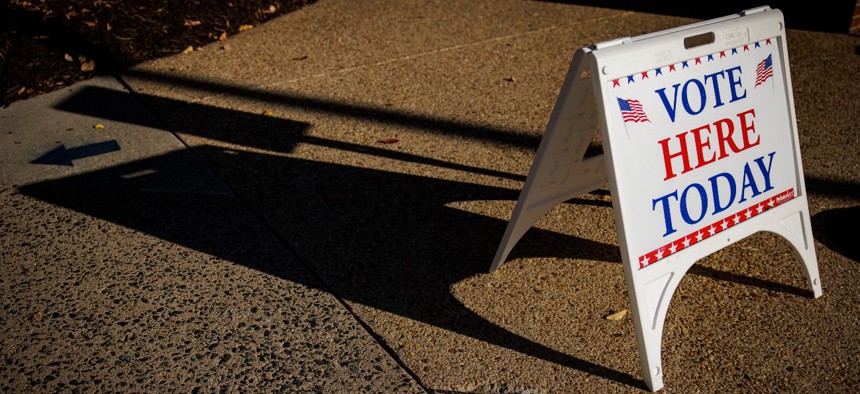Some Federal Agencies Aren't Fulfilling Biden's Promise to Give Time Off to Vote

A sign sits outside of an early voting location at the Stafford County Government Center in Virginia on Nov. 3. Samuel Corum/Getty Images
Agencies are exploiting loopholes or issuing restrictive policies, confounding staff.
Several agencies are ignoring or putting tight restrictions on the Biden administration’s directive to provide extra time off for employees to vote or work at the polls, according to dozens of workers, the union representing them and internal policies reviewed by Government Executive.
President Biden in March 2021 signed an executive order telling agencies they should provide staff four hours of paid administrative leave to vote in any federal, state, local or tribal election and an additional four hours to serve at the polls as a volunteer. In practice, according to federal personnel and the American Federation of Government Employees, front-line supervisors at a slew of offices are outright rejecting most requests for the time off.
Jacque Simon, policy director at AFGE, said in federal offices across the country managers have disapproved of the administrative leave without explanation or even issued blanket denials to all requests. Employees reported trying to engage with leadership to discuss Biden’s order and subsequent Office of Personnel Management guidance implementing it, but have largely been rebuffed.
OPM told agencies they "should" allow employees to take the leave, providing some leeway as it did not say they must do so. The time off is “subject to a determination by the agency that the employee can be relieved of duty during the specific period of time requested by the employee without significantly impairing mission-essential operations,” OPM said.
Still, agencies appear to be taking a more restrictive approach than set by the administration. The Government Publishing Office, for example—which employees had flagged as rejecting requests—provided its election leave policy, which included significant conditions for approval not included in the EO or OPM’s guidance. GPO, as a legislative branch agency, was not technically subject to Biden’s order, but Simon noted it reflected a similar approach that many agencies have taken.
To qualify for the bonus leave, GPO said, employees must be unable to vote due to work duties—such as due to work-related travel—and not have access to absentee voting. Early voting options must also be the same hours as normal election day hours to remain eligible for the time off. If an employee can vote on alternative days earlier in the morning or later at night than is available on Nov. 8, GPO would not provide administrative leave. Gary Somerset, a GPO spokesman, said the agency’s policies “certainly meet [the Biden] order’s spirit and intent.”
Other agencies that employees flagged as non-receptive to leave-for-voting requests included the Veterans Affairs Department, Transportation Security Administration, Social Security Administration and Defense Department. Carter Langston, a TSA spokesman, said individual facilities could reject requests if there are concerns about too many employees taking off. Ensuring adequate staffing at any given time, he said, is “job number one.”
“TSA provides its workforce with leave to accommodate voting, if it’s necessary to vote during work hours,” Langston said. “In granting leave requests, the agency must also balance the needs of its operational and mission requirements. TSA encourages employees to vote and exercise their right to do so.”
VA’s policy instructed supervisors they “shall” grant the leave, subject to the needs of the agency. It stressed that employees must seek approval prior to taking the leave so as to not disrupt operations.
“VA encourages participation in the democratic process for our entire community, including veterans and VA employees,” spokesperson Randy Noller said. “To that end, we direct supervisors to allow all employees time for voting and volunteering to work polls, as written in VA and OPM policies.” He did not directly address allegations that VA supervisors were not living up to that direction.
OPM directed agencies to proactively inform all employees of their eligibility for the administrative leave, which TSA did last month in a staff-wide email. Many employees, however, said such notifications were not taking place.
Simon suggested agencies were looking for excuses to deny the leave request, in opposition to the spirit of Biden’s order and OPM’s guidance. The human resources agency said its instructions would support the “fundamental goals” of promoting democracy, reducing barriers to voting for federal employees and to positioning the federal government “as a model employer.” OPM did not respond to a request for comment.
“They’ve got this loophole that they are exploiting, which is unfortunate,” Simon said. She added many states have required the time off for voting and the government was being comparatively restrictive. “Instead of encouraging people to vote, it is putting up obstacles.”






